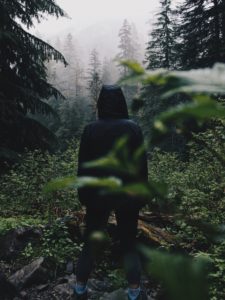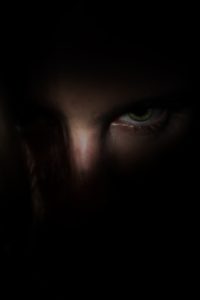It’s hunting season in Maine. Several days ago a woman was accidentally shot and killed on her own property at 10:30 in the morning by a hunter. We frequently hear shots in the neighborhood, and although we don’t allow hunting on our land, there’s nothing to prevent a hunter wandering in, attracted by the deer, game birds and waterfowl on our 26 acres.
I bought a cheap orange vest I can wear over my coat for my morning walks.
Wearing orange during hunting season is such a simple and obvious safety tactic that I didn’t think twice about doing it, but the first morning I went out with the vest on I discovered a lot of complex feelings about being so visible in the world.
The first thing I noted was how dangerously exposed I felt. I do not want to be seen by human eyes. I don’t mind if the wildlife sees me, but if they do I’m less likely to see them, so I do my best to move quietly and unobtrusively through the landscape, wearing neutral, natural colors. I stop and sit or lean against a tree for long stretches, hardly moving, watching the river and listening to the woods around me.
The orange vest shrieks, “Look at me! I’m here!” and I hate it. It’s more than just my preference to blend in to backgrounds and maintain protective camouflage. It seems a life-and-death necessity to avoid being seen.
I’ve been aware of my hypervigilance for some time now. I’ve never been comfortable in crowds. If I’m not able to position myself in a corner or with my back to something solid and watch, listen and evaluate, anxiety quickly disables me. I need to know where the exits are in any indoor space.
This is interesting, as I’m fascinated by people, and people watching is one of my favorite activities. I’ve frequently longed to be invisible, to watch and listen freely and leave no trace of my presence. If I could be invisible, I imagine I’d still get overstimulated by noise, activity and technologically-generated energy, but I’d feel safer.
The strength of my feelings as I donned the orange vest begged the question: What happens if somebody sees me? What’s so terrible?
That’s easy. Criticism happens. Judgement, abuse (verbal, emotional, physical), negative feedback happen. If I’m seen doing anything, I’m sure to be doing it wrong (according to the observer, anyway). I’m sure to disappoint. I’m sure to be inadequate or inappropriate. My clothes are wrong. I’m clearly behaving like a slut, going out on my own land in my men’s Carhartt jeans and old boots. My hair is wrong. My choices are wrong. If I’m heading for the northern boundary of our land, I should be walking the southern border. I’m too noisy. I’m in someone’s way. I’m too slow. I’m wasting my time and should be doing something more productive. I’m irresponsible. I’m lazy. I’m selfish. I’m scaring the fish. I’m scaring the birds. I’m scaring the animals. I should be ashamed of myself.
Wow. No wonder I don’t want to be seen. Who knew the perils?
I didn’t know, until my ugly orange vest dredged all this up from my swampy subconscious.
On subsequent mornings, as I’ve walked in my orange vest, I’ve thought about the tension between being seen and avoiding being seen. How can anyone be in the world without being seen, even the most self-effacing of us? Refusing to be seen is refusing any healthy human connection. How do we get hired without being seen, or accepted for college? How do we follow our creativity or passion if we’re afraid to be seen? How do we engage in face-to-face conversation or discussion, or participate in politics or as a volunteer?
On the other hand, how much exposure is too much? How can we avoid being seen by the shooter at the concert, in church or in the movie theater? We seem to be gradually becoming more and more captive to the Matrix, which makes us increasingly vulnerable to identity theft, technological sabotage and cyber-based terrorism.
I sometimes feel I carry protecting my privacy too far. I can’t say I regret not being on Facebook and other social media, as I’ve yet to hear about anything there that I need. On the other hand, not having a cell phone in today’s world creates a lot of problems for me. My personal issues with being seen are in the context of much wider social issues about exposure and safety. I don’t have any answers for the wider social problems. I wish I did.
For myself, though, it’s clear I need to address some of my subconscious beliefs about what will inevitably happen if I am seen. I’ve also developed a thicker skin about being criticized and judged. At this point in my life I’m really not much interested in the criticism and judgement of others. What interests me is how I feel about myself. My list of terrors about what happens if I’m seen is decades out of date, and I’ve already survived those consequences many times over. More of the same is boring rather than terrifying.
I’m stuck with my orange vest for several more weeks, and that’s OK. I’ve come to terms with it. In fact, I’m grateful to it, because it exposed some old wounds that needed attention. I’m stepping into plain sight In many ways in my life, this blog being one of the most prominent and challenging. Now I’ll practice walking this land in plain sight as well.
All content on this site ©2017
Jennifer Rose
except where otherwise noted
© 2017 – 2022, Jenny Rose. All rights reserved.


Thanks Jen. This one really hit home.
You can articulate in words that I cannot, but feel in my head and heart,mostly unidentified and unacknowledged.
Your blogs come to me just when I need them the most. Thank you.
Blessings,
Margie
Thanks for being such a loyal reader, Margie. Jenny